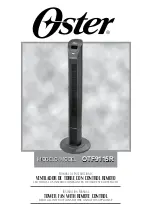
Figure 4
How to Operate Your Ceiling Fan
2.
Restore electrical power to the outlet box by turning
the electricity on at the main fuse box. (Figure 2)
Check to see that all connections are tight, including
ground, and that no bare wire is visible at the wire
connectors, except for the ground wire. Do not
operate fan until the blades are in place. Noise and
fan damage could result.
WARNING
1. IMPORTANT:
Using a full range dimmer switch
(not included) to control fan speed will damage the fan.
To reduce the risk of fire or electrical shock, do not use
a full range dimmer switch to control the fan speed.
(Figure 1)
WARNING
Do not operate this fan with a variable (Rheostat) wall
controller or dimmer switch. Doing so could result in
damage to the ceiling fan's remote control unit.
15
MAIN FUSE BOX
Figure 2
Figure 1
For illustrative purposes only
-not
intended to cover all types of controls
3.
To make fan operational, install 23A/12V battery
(included) in hand-held remote transmitter, with fan
power off. Then follow the remote code setting
process. (If not used for long periods of time, remove
battery to prevent damage to transmitter). Store the
remote away from excessive heat or humidly.
(Figure 3)
NOTE: The remote unit has 32 different code
combinations. To prevent possible interference from
or to other remote units, simply change the combination
code in the remote and receiver.
NOTE: Factory setting is all up. Do not use this position.
5.
Remote functions: (Figure 5)
Figure 5
4.
To set the remote code same positions as the
receiver with a small screwdriver or ball point pen
(neither included), slide dip switches firmly up or
down. (Figure 4)
Remote
Dip Switch
ON DIP
1
2
3
4
5
12V 23A
Battery (1 pcs)
Figure 3
















































